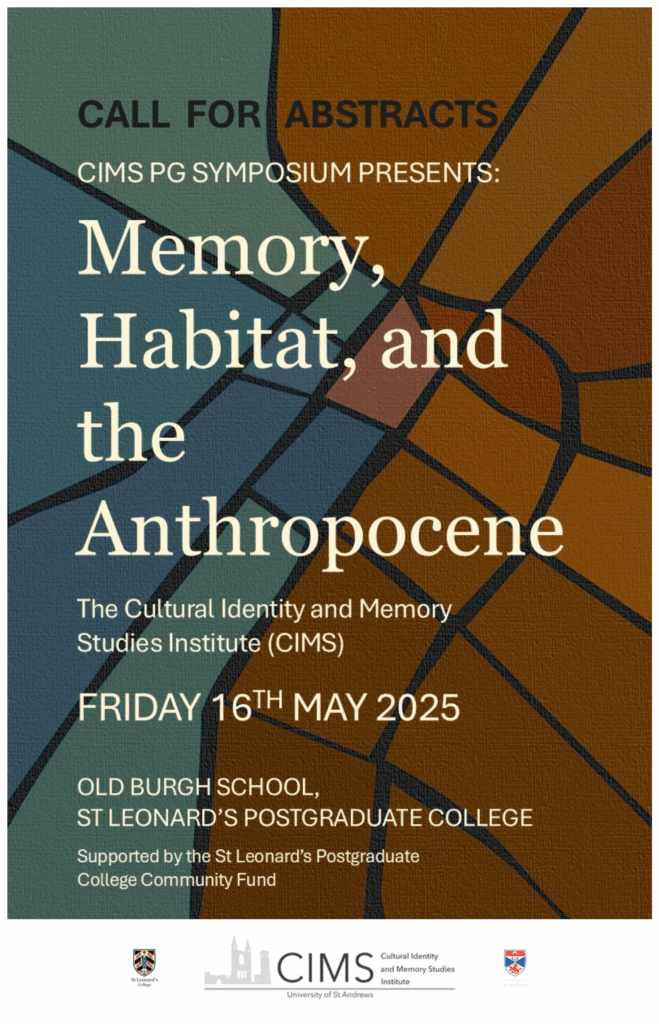CIMS Postgraduate Symposium 2025
‘Memory, Habitat, and the Anthropocene’

Date: Friday, 16 May 2025
Venue: Old Burgh School, St Leonard’s Postgraduate College
Supported by: St Leonard’s Postgraduate College Community Fund
Hosted by: Cultural Identity and Memory Studies Institute (CIMS)
Organisers: Gabriela Milkova Robins (CIMS Research Assistant/School of English) and Rhiannon Morton (Visiting Doctoral Researcher/School of Geography)
Overview
The 2025 CIMS Postgraduate Symposium, hosted by the Cultural Identity and Memory Studies Institute (CIMS), brought together a diverse cohort of postgraduate scholars and practitioners for a full-day symposium exploring the interdisciplinary nature of environmental change, cultural memory, and material habitat. The event was fully booked, with 25 participants from our postgraduate and staff community attending the full day’s events. The event featured a keynote address, a postgraduate flashtalk panel, a roundtable discussion, and a collaborative art workshop—each contributing to the intellectual and creative enrichment of the event.
Keynote Address
Dr. Kirsty Robertson
Title: “Shadow Collection: Chemical Intimacies and Plastic Memory in the Museum”
Dr. Robertson (Canada Research Chair in Museums, Art, and Sustainability at Western University and 2024-25 Senior Global Fellow with the Centre for Energy Ethics at St Andrews) delivered a wide-ranging and theoretically engaged address on the material and chemical legacies of plastic in museum collections. The talk explored how the shadow collection disrupts linear models of time and permanence in the museum. Drawing on feminist materialisms and critical museology, her lecture advanced a theory of “feral plastics” and challenged curatorial logics of purity, permanence, and linearity.
Postgraduate Flashtalk Panel
The flashtalks were divided into two thematic segments, followed by Q&A sessions:
Panel 1:
- Fritha West: “The rise and fall of elm: the meaning of ‘loss’ for tree species in Great Britain”
- Volodymyr Hudgins: “The 1884 Range of the Common Skate Complex and Other British Elasmobranchs Inferred from Notes by W. C. McIntosh”
- Soleil Laurin: “A Polluted Legacy: The Lasting Effects of Environmental Health from Generation to Generation”
Panel 2:
- Gwenffrewi Morgan: “Remembering ‘geologically’ in twelfth-century Britain”
- Gabriel Beckford-Tongs: “Disinvention and Fugitivity: Decolonial Language Education Under Occupation”
These brief but incisive talks illustrated the diversity of methodological approaches and thematic engagements among postgraduate researchers working at the intersection of memory, ecology, and politics. It made for a lively discussion before we broke for lunch.
Postgraduate Roundtable
The roundtable offered longer-format presentations and discussion from students across disciplines:
- Benjamin Ong: “The Undergrowth Has Become a Wilderness: Ecological Memories in a Botanic Garden”
- Sofie Flowers: “‘This Cold Metallic Motion’: Tyrannical Machinery in Elizabeth Barrett Browning”
- Kate Schlegel: “Crafting a New Present: Collective Memory and Identity in May Morris’ Embroideries”
Chaired by Gabriela Milkova Robins in a discursive format, the roundtable illuminated common themes of ecological loss, artistic response, and multispecies memory. The interplay of literary analysis, environmental humanities, and historical critique provoked fruitful dialogue among attendees.
Art Workshop
Facilitator: Melody Bellefeuille-Frost
Title: “Layered Materials, Layered Memories: A Visual Reflection on the Symposium”
As the concluding component, this workshop provided participants with a tactile mode of engagement and opportunity for creative reflection. Using mixed media and collage, Melody invited the participants to reflect on transience, material memory, and place. The workshop acted as both a synthesis and an extension of the day’s thematic inquiries. Each of the participants were able to create their own collage out of a myriad of materials (newspaper clippings, magazines, rice paper, etc.) and then discuss how their collage was inspired by or related to the day’s events.
Critical Reflections
The CIMS PG Symposium 2025 demonstrated a rare integration of academic depth and artistic expression. Noteworthy features included:
- A unifying thematic thread across all panels and workshops
- Consistent critical engagement with the Anthropocene as both a material and discursive condition
- A truly interdisciplinary event, with talks that covered art history, medieval history, biology, geography, social anthropology, literary studies, sustainable development, museum and curatorial studies, visual arts, and education.
The in-person feedback was excellent, with people mentioning that the CIMS PG Symposium is the highlight of their year, and that it is one of the most interdisciplinary events that occur in St Andrews.
We encourage participants to give written feedback as well, and to sign up to our mailing list.
Conclusion
“Memory, Habitat, and the Anthropocene” offered a compelling snapshot of current postgraduate research at the intersection of ecology, memory, and culture cross-departmentally at St Andrews. The symposium was a success in advancing interdisciplinary dialogue and fostering critical reflection on memory, habitat, and the Anthropocene.























